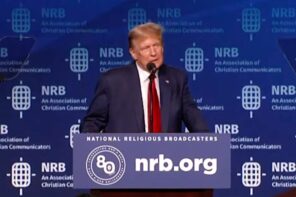When the Supreme Court hears oral arguments December 5 in Masterpiece Cakeshop v. Colorado Civil Rights Commission, it will be the first time the Court has taken up a major gay-rights case since its historic June 2015 ruling in Obergefell v. Hodges, which established marriage equality as a constitutional right.
Much has changed since June 2015, not least of which is the unexpected death of Justice Antonin Scalia and then, following the Senate’s unprecedented refusal to vote on Obama’s nominee, the confirmation of Neil Gorsuch as Scalia’s replacement. Masterpiece Cakeshop will be the first case with significant implications for the LGBT community that Gorsuch will hear from the bench.
In my first two pieces I examined aspects of the Masterpiece Cakeshop case itself. Here I want to focus on Justice Gorsuch, one of the newest players in a dispute that has stretched over more than five years since Craig and Mullins’s ill-fated visit to Phillips’s bakery. From what we know of Gorsuch’s views on religious liberty and LGBT rights, he may be one of the Court’s most reliable votes in favor of Phillips.
Though Gorsuch decided relatively few gay rights cases during his eleven years on the Tenth Circuit Court of Appeals, LGBT advocates expressed concern when President Donald Trump nominated him to the highest court in the land. Some pointed out that Gorsuch had written an op-ed for National Review in which he criticized liberals for an “overweening addiction to the courtroom” on issues such as same-sex marriage. Others noted that he had written his Oxford University doctoral dissertation on assisted suicide under the direction of Professor John Finnis, a philosopher and natural law theorist with a long record of opposing same-sex marriage.
In that scholarly tome, Gorsuch embraced Finnis’s view that promoting personal autonomy is an insufficient reason for government to permit what it might reasonably regard as poor choices, including assisted suicide. One key passage finds Gorsuch drawing an analogy that is, quite literally, paternalistic:
Ruling out a ‘bad choice’ does not necessarily evince disrespect for the chooser, but for the choice he or she made; after all, parents punish children who make bad choices, not because they disdain them, but because they love them and do not wish to see them make bad decisions.
Gorsuch’s confirmation hearings did little to alleviate LGBT advocates’ fears that he might regard them, too, as having made “bad decisions.” Responding to a question from Senator Dick Durbin (D-Illinois), Gorsuch declined to categorize LGBT people as a “class,” that is, as a group who could look to the courts for equal protection. Instead, he answered, “I’ve tried to treat each case and each person as a person—not a ‘this kind of person,’ not a ‘that kind of person.’” While he went on to declare Obergefell “absolutely settled law,” it was unclear just how far Gorsuch believes that landmark decision reaches.
Fast forward to June 2017, when the Supreme Court issued its opinion in Pavan v. Smith. Marisa Pavan and her wife were one of two lesbian couples who sued the state of Arkansas for refusing to list both spouses’ names on the birth certificates of the children that they had conceived by way of anonymous donors. Under Arkansas law, the name of a married woman’s husband is to be listed on the birth certificate of a child conceived through anonymous sperm donation, but Pavan and her advocates argued that treating same-sex spouses differently violates Obergefell’s promise of equal treatment for all couples. The Court agreed and, in an unusual move, reversed the lower courts’ judgments without oral argument. This “summary reversal” provoked a sharp dissent from Gorsuch, joined by two other conservative justices, Clarence Thomas and Samuel A. Alito, Jr.
They argued that, Obergefell notwithstanding, the state still had a specific interest at stake: that of maintaining “a biology based birth registration regime” for purposes such as “ensuring government officials can identify public health trends and helping individuals determine their biological lineage, citizenship, or susceptibility to genetic disorders.” On technical grounds, they added, Pavan and the other plaintiffs had not challenged the provision of Arkansas law that concerns birth by artificial insemination, but instead a broader provision that implicates “the State’s authority… to enforce a birth registration regime generally based on biology.”
These admittedly few examples tend to suggest that Justice Gorsuch is not particularly well disposed toward expanding the rights of LGBT people, at least not as a group. Yet the distinctive combination of claims about LGBT rights and religious freedom in Masterpiece Cakeshop makes it especially likely that the newest justice will support Phillips, the baker, in obtaining an exemption from Colorado’s anti-discrimination laws.
During his career as an appellate judge, Gorsuch has been notably willing to carve out exemptions for litigants with strongly held religious beliefs. He was on a panel of the Tenth Circuit that in 2013 issued a split decision in favor of Hobby Lobby and Mardel, two companies owned by an evangelical Christian family whose members refused on religious grounds to obey the Affordable Care Act’s mandate that they insure their employees for certain contraceptive drugs and devices that they regard as abortifacients.
The majority of the Tenth Circuit panel held that the companies are “persons exercising religion” that can claim protection under the federal Religious Freedom Restoration Act (RFRA) of 1993. RFRA mandates that when the government substantially burdens someone’s religious practice, it permissibly does so only when it is furthering a compelling state interest, and only when it is using the “least restrictive means” to achieve its aim.
Employing this analysis, the Tenth Circuit majority found that Hobby Lobby’s and Mardel’s religious freedom was indeed substantially burdened, and further that the government’s refusal to exempt family-owned businesses from the ACA’s requirements (as it did for religious organizations) meant that the law was not the least restrictive means of achieving the government’s goals. The Supreme Court reasoned similarly when it upheld the Tenth Circuit’s decision, 5-4, the following year.
Not only did then-Judge Gorsuch join the Tenth Circuit majority in Hobby Lobby v. Sebelius, but he also wrote a concurring opinion in which he held that both the businesses and the Green family had standing to contest the ACA’s requirements. Articulating an expansive view of the scope of RFRA protections, Gorsuch depicted the Greens as being forced to choose “between abiding their religion or saving their business”: the same dilemma Phillips claims to face in Masterpiece Cakeshop.
In his opinion, Gorsuch made clear that he does not think it the courts’ duty to reach any particular judgment about the content of what the Greens believe. Specifically, their position on the question of “[w]hether an act of complicity is or isn’t ‘too attenuated’ from the underlying wrong is sometimes itself a matter of faith we must respect” (emphasis added). In other words, so long as the Greens’ religious beliefs, however “contestable” or even “offensive,” are “sincerely held,” they deserve protection from all but the most necessary and narrowly tailored burdens.
Hobby Lobby and Masterpiece Cakeshop are similar in important respects: both involve businesses closely held by devout Christians who believe that the law is penalizing them for following their religion. Both involve laws that already explicitly provide exemptions for churches, other places of worship, and religiously affiliated nonprofits. Yet the cases are not identical. From a legal point of view, Hobby Lobby is about the statutory regime of RFRA, but Masterpiece Cakeshop has been framed primarily in constitutional terms, concerning the rights to free speech and religious practice. And substantively, the government articulated its interest in Hobby Lobby in terms of public health and gender equality, whereas the law at stake in Masterpiece Cakeshop aims instead to end discrimination on the basis of sexual orientation.
From all that we have seen here, the constellation of issues that Masterpiece Cakeshop raises point firmly toward a Gorsuch vote in Phillips’s favor. If I’m right, of course, Gorsuch will not swing the result, since his predecessor, Antonin Scalia, was no champion of LGBT rights.
But Scalia was no champion of expansive claims to religious freedom, either. In fact, he authored the very decision limiting such claims that Congress sought to overrule when it enacted RFRA. Gorsuch has not only embraced a capacious reading of RFRA, but he has shown reluctance to apply the tools of judicial scrutiny to LGBT people as a class. Perhaps we shouldn’t be surprised that, in the end, the Supreme Court only granted certiorari in Masterpiece Cakeshop in June 2017, more than six months after Jack Phillips’s petition arrived, but only ten weeks after Gorsuch did.





